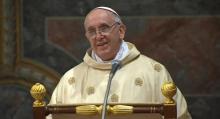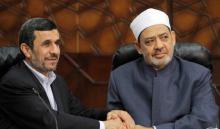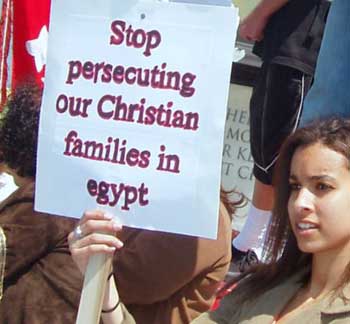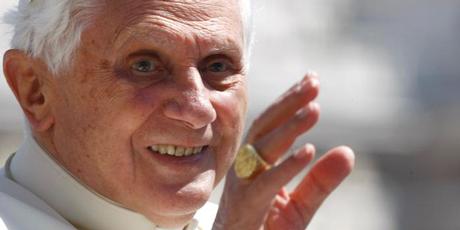
Pope Francis celebrates his inaugural Mass in March. (AP Photo/CTV)
(CNSNews.com) – Seven years after Sunni Islam’s foremost institution severed dialogue with the Vatican over remarks by Pope Benedict XVI, the Cairo-based Al-Azhar wants the new pontiff to open the door to resuming interfaith discourse by declaring Islam to be a peaceful religion.
The proposal that Pope Francis make such a public declaration prompted Coptic Christian advocates to suggest that Al-Azhar’s grand imam instead denounce Muslim violence against Copts in Egypt.
Established in the 10th century, Al-Azhar is regarded as the top seat of learning in Sunni Islam. The suggestion for a papal gesture came from grand imam Ahmed al-Tayyeb’s diplomatic envoy, Mahmoud Abdel Gawad.
“The problems that we had were not with the Vatican but with the former pope,” weekend Arab media reports quoted Gawad as telling the Italian newspaper Il Messaggero.
“Francis is a new pope. We are expecting a step forward from him,” he said. “If in one of his addresses he were to declare that Islam is a peaceful religion, that Muslims are not looking for war or violence, that would be progress in itself.”
Gawad suggested further that should the pope visit Egypt he could also visit Al-Azhar. “At that point, relations and dialogue would be restored immediately.”
(Coptic Pope Tawadros II visited the Vatican in May and invited Pope Francis to visit Egypt; the Vatican said the invitation will be taken up although no dates have been announced.)
Reacting to the proposals by al-Tayyab’s envoy, Voice of the Copts president Ashraf Ramelah suggested the grand imam look closer to home.

Al-Azhar grand imam Ahmed al-Tayyeb, seen here with visiting Iranian President Mahmoud Ahmadinejad at Al-Azhar headquarters in Cairo on February 5, 2013. (AP Photo/Amr Nabil)
Al-Tayyeb should “issue a formal, public statement directed to his followers in the Arabic language conveying an unequivocal message that Muslims attacking Christians in Egypt do not conform to a tenet of Islam and will no longer be tolerated,” he said in a statement.
“A clear denunciation of Muslim sectarian violence against Christians in Egypt by Sunni religious leaders would be welcomed as Al-Azhar seeks the Pope’s endorsement of Muslim non-violence.”
The rise of a Muslim Brotherhood government in Egypt has sparked deep concern among Egyptian Christians, fueled by outbreaks of deadly violence. The U.S. Commission on International Religious Freedom in its latest report cited “discriminatory and repressive laws and policies” and said that despite some improvements “the Egyptian government continues to engage in and tolerate systematic, ongoing, and egregious violations of freedom of religious freedom.”
Ramelah said despite discrimination and persecution targeting Copts, in 1,400 years not one Egyptian Muslim authority, including the succession of Al-Azhar grand imams, had denounced or apologized for such actions.

Invited to comment, the Australian Coptic Movement Association (ACM) said Tuesday the grand imam “would serve the Islamic religion better if he pushed for a cessation of persecution of Christians in Islamic majority nations.”
“How can he expect or even request of His Holiness Pope Francis to declare Islam a peaceful religion when Coptic Christians are being slaughtered all over Egypt?” said ACM spokesman Peter Tadros.
“Many Copts have been detained under flimsy blasphemy charges in Egypt and there is no end in sight to continuous attacks on Copts and their properties in Egypt.”
Tadros questioned the relevance of simply declaring a religion to be peaceful.
“What matters is how the followers of religion practice their faith and their attitudes to followers of other religions or followers of no religion,” he said. “Unfortunately, Egypt’s Coptic minority is living under siege and Pope’s Francis comments on whether or not Islam is a religion of peace will little or no impact on the plight of Coptic Christians back in Egypt.
“If anything, it will serve the purpose of those who persecute Christians throughout the entire Middle East/North Africa region.”
Frozen dialogue

“Show me just what Mohammed brought that was new, and there you will find things only evil and inhuman, such as his command to spread by the sword the faith he preached,” Benedict quoted Manuel II Palaeologus as saying.
“To convince a reasonable soul, one does not need a strong arm, or weapons of any kind, or any other means of threatening a person with death …” the emperor had said, according to Benedict.
The controversial excerpts from the scholarly lecture at Regensburg University in Germany, which included an appeal for dialogue based on “reason,” drew an angry response from across the Islamic world. Al-Tayyeb’s predecessor at Al-Azhar, Muhammad Sayyed Tantawi, said the comments demonstrated a “clear ignorance of Islam.”
The pope said subsequently he was “deeply sorry” for the reaction of Muslims, and that the passages he quoted did not reflect his own views. (Egypt’s Muslim Brotherhood were among Islamic bodies that rejected that apology as insufficient.)
A resumption of dialogue occurred in 2009, but Al-Azhar froze it again after Benedict in early 2011 condemned as “a vile act of death” a bombing of a church in Alexandria that killed 23 people. The pope referred to a “strategy of violence that has targeted Christians” in Egypt and Iraq, and called such attacks “an offense against God and all humanity.”
Tantawi accused the pope of “unacceptable interference in Egypt’s affairs,” to which Vatican spokesman Federico Lombardi responded that “we cannot see how the pope’s approach to bring everybody to accept non-violence can be considered meddling.”
In an article later that year, published in Al-Ahram daily, Tantawi wrote, “We have grown used to the honorable pope saying that the Muslims did not understand his [Regensburg] speech, but now we cannot ignore what happened. The pope does not act and is not shocked when rivers of Muslim blood flow in Iraq and Palestine, but he is shocked when [violence] is somehow related to Christians …”
Source material can be found at this site.









